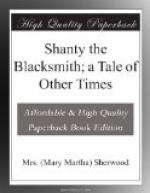And here the memorandum from which this story is derived, becomes less particular in the details.
It speaks of Mr. Salmon after the various exertions he had made, (these exertions having been as it was supposed succeeded by a stroke,) sinking almost immediately into a state nearly childish, during which, however, it was a very great delight to Tamar, to perceive in the very midst of this intellectual ruin an awakening to things spiritual; so that it would seem, as if the things hidden from him in the days of human prudence and wisdom, were now made manifest to him, in the period of almost second childishness.
Tamar had been enabled to imbibe the purest Christian principles, in her early youth, for which, humanly speaking, she owed much to Shanty, and she now with the assistance of the kind old man, laboured incessantly, to bring her father to the Messiah of the Christians, as the only hope and rest of his soul; and she had reason before her father died, to hope that her labours had not been without fruit. As to worldly pelf, she had it in rich abundance, but she could have little personal enjoyment of it whilst shut up with her aged father in Dymock’s Tower, yet she had exquisite delight in humouring therewith, the fancies of Dymock, and administering to the more sober and benevolent plans of Mrs. Margaret; for this lady’s principal delight was, to assist the needy, and her only earthly or worldly caprice, that of restoring the Tower and its environs, and furnishing, to what she conceived had been its state, in the, perhaps, imaginary days of the exaltation of the Dymocks.
A splendid feast in the halls of Dymock’s Tower, is also spoken of, as having taken place, soon after the return of the Laird from London, from which, not a creature dwelling on the moor was absent, when Salmon directed Tamar to reward those persons who had assisted him in his greatest need, and when Mrs. Margaret added numbers of coats and garments to those that were destitute. Dymock in his joy of heart, caused the plough to be brought forward, and fixed upon a table in the hall, for every one to see that day, Mrs. Margaret having been obliged to acknowledge, that it was this same plough, which had turned up the vein of gold, in which all present were rejoicing.
With the notice of this feast the history terminates, and here the writer concludes with a single sentiment,—that although a work of kindness wrought in the fear of God, as imparted by the Lord, the Spirit—seldom produces such a manifest reward, as it did in the case of Mrs. Margaret and her nephew, for the race is not always to the swift, nor the burthen to the strong, yet, even under this present imperfect dispensation, there is a peace above all price, accompanying every act, which draws a creature out of self, to administer to the necessities of others, whenever these acts are performed in faith, and with a continual reference to the pleasure of God, and without view to heaping up merits, which is a principle entirely adverse to anything like a correct knowledge of salvation by the Lord the Saviour.




